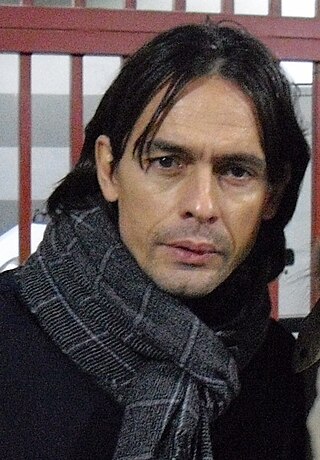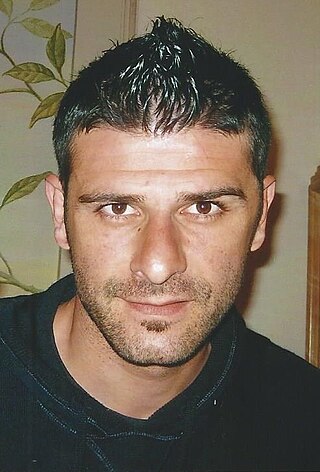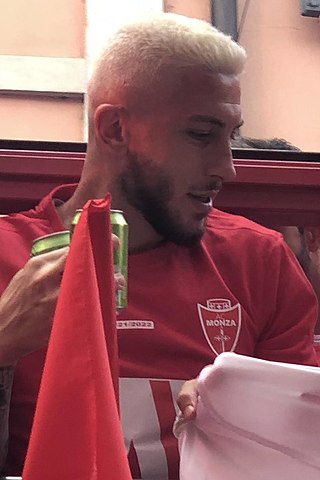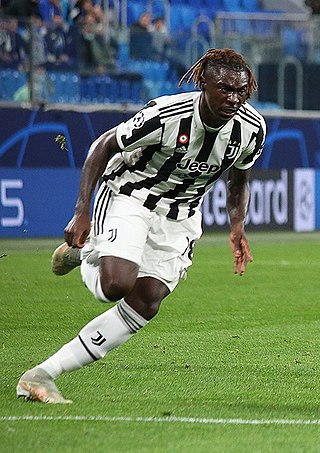Related Research Articles

Giampiero Boniperti was an Italian footballer who played his entire 15-season career at Juventus between 1946 and 1961, winning five Serie A titles and two Coppa Italia titles. He also played for the Italy national team at international level and took part in the 1950 and 1954 FIFA World Cup finals, as well as the 1952 Summer Olympics with Italy. After retirement from professional football, Boniperti was a CEO and chairman of Juventus and, later, a deputy to the European Parliament.

Paolo Rossi was an Italian professional footballer who played as a forward. He led Italy to the 1982 FIFA World Cup title, scoring six goals to win the Golden Boot as top goalscorer, and the Golden Ball for the player of the tournament. Rossi is one of only three players, and the only European, to have won all three awards at a World Cup, along with Garrincha in 1962 and Mario Kempes in 1978. Rossi was also awarded the 1982 Ballon d'Or as the European Footballer of the Year for his performances. Along with Roberto Baggio and Christian Vieri, he is Italy's top scorer in World Cup history, with nine goals overall.

Filippo "Pippo" Inzaghi is an Italian professional football manager and former player who played as a striker. He is the head coach of Serie B club Pisa.

Roberto Boninsegna is an Italian former professional footballer who mainly played as a forward. After retiring, he worked as a football manager. As a player, he played for the Italy national side at two World Cups, reaching the final in 1970.

Vincenzo Iaquinta is an Italian former professional footballer who played as a striker.

Alessandro Matri is an Italian former professional footballer who played as a striker.

Nicola Legrottaglie is an Italian former professional footballer who played as a centre back.

Marco Ferrante is an Italian former professional footballer who played as a forward. With 125 total goals scored for Torino, he is the fifth-highest scorer in the history of the Torinese club behind Guglielmo Gabetto (127) and ahead of Valentino Mazzola (123).

Alessandro Del Piero is an Italian former professional footballer who mainly played as a second striker, although he was capable of playing in several offensive positions. Since 2015, he has worked as a pundit for Sky Sport Italia. A technically gifted and creative supporting forward who was also a free-kick specialist, Del Piero won the Serie A Italian Footballer of the Year award in 1998 and 2008 and received multiple nominations for the Ballon d'Or and FIFA World Player of the Year.

Luca Marrone is an Italian professional footballer who plays as a centre-back or defensive midfielder for Serie C Group A club Lecco.
Pierino Fanna is an Italian professional football coach and a former player, who played in midfield, either as an attacking midfielder or as a winger.
Domenico Marocchino is a retired Italian professional football player and manager, who played as a midfielder.
Marco Pacione is a retired Italian professional football player who played as a forward.

Simone Zaza is an Italian professional footballer who plays as a striker.

Fausto Rossi is an Italian professional footballer who plays as a central midfielder for Serie C Group A club Vicenza.

Grigoris Kastanos is a Cypriot professional footballer who plays as an attacking midfielder or right winger for Serie A club Hellas Verona, on loan from Serie B club Salernitana, and the Cyprus national team.

Andrea Favilli is an Italian professional footballer who plays as a striker for Serie B club Bari, on loan from Genoa.

Dušan Vlahović is a Serbian professional footballer who plays as a striker for Serie A club Juventus and the Serbia national team.

Moise Bioty Kean is an Italian professional footballer who plays as a forward for Serie A club Fiorentina and the Italy national team.
Andrea Cambiaso is an Italian professional footballer who plays as a full-back or wing-back for Serie A club Juventus and the Italy national team.
References
- 1 2 3 4 5 6 7 8 Stefano Bedeschi (24 October 2015). "Gli eroi in bianconero: Domenico PENZO" (in Italian). Tutto Juve. Retrieved 10 March 2017.
- 1 2 3 4 5 6 7 8 9 10 11 "Domenico PENZO" (in Italian). Hellastory.net. Retrieved 10 March 2017.
- ↑ "La rosa" (in Italian). Storia Piacenza 1919. Retrieved 11 March 2017.
- ↑ "Meteore in biancorroso – Domenico Penzo" (in Italian). Storia Piacenza 1919. Archived from the original on 2 December 2018. Retrieved 11 March 2017.
- ↑ "Penzo alla Juve, Dirceu a Napoli, Jordan a Verona" (in Italian). La Stampa. 3 July 1983. p. 20. Retrieved 11 March 2017.
- ↑ "14 settembre 1983, La Juve cala il settebello polacco" (in Italian). Tutto Sport. 14 September 2010. Archived from the original on 12 April 2013. Retrieved 10 March 2017.
- ↑ MARIO SCONCERTI (7 July 1984). "IN SETTE PER UNO SCUDETTO" (in Italian). La Repubblica. Retrieved 10 March 2017.
- ↑ FRANCO ROSSI (11 September 1986). "E ANCHE AD EMPOLI PASSA LO STRANIERO" (in Italian). La Repubblica. Retrieved 10 March 2017.
- 1 2 Carlo Martinelli (19 March 2005). "Thöni, promozione o rimozione? Questo è il dilemma" (in Italian). Alto Adige. Retrieved 10 March 2017.
- ↑ Giulio Accantino (8 July 1983). "Sarò la spalla giusta per Rossi" (in Italian). La Stampa. p. 25. Retrieved 10 March 2017.